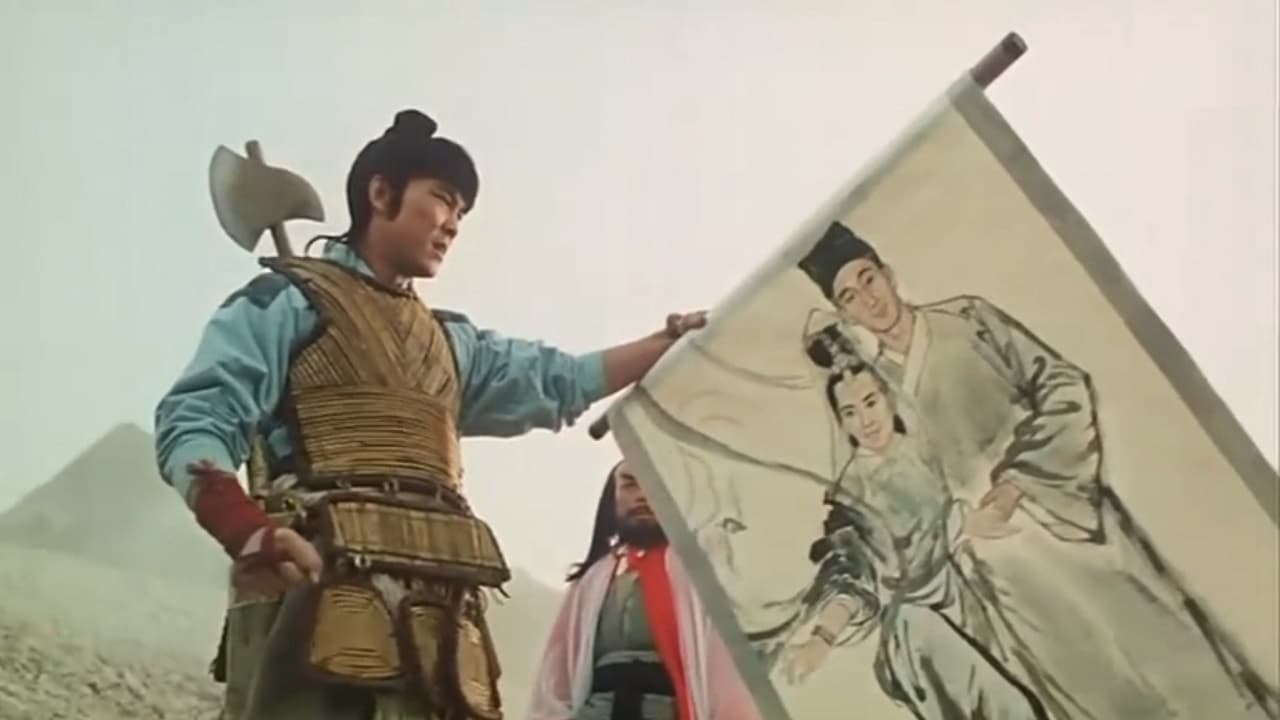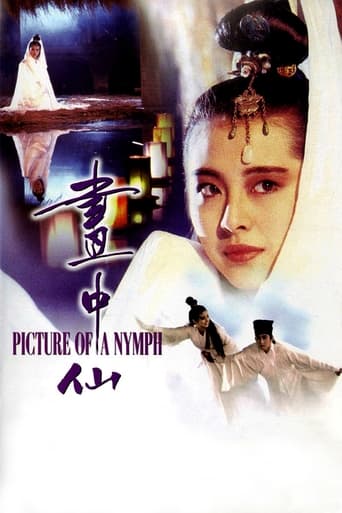SoftInloveRox
Horrible, fascist and poorly acted
Voxitype
Good films always raise compelling questions, whether the format is fiction or documentary fact.
Ogosmith
Each character in this movie — down to the smallest one — is an individual rather than a type, prone to spontaneous changes of mood and sometimes amusing outbursts of pettiness or ill humor.
Sameer Callahan
It really made me laugh, but for some moments I was tearing up because I could relate so much.
OllieSuave-007
This movie was released in Hong Kong less than a year after the iconic and fabulous A Chinese Ghost Story. A similar film, this story deals with Taoist monk disciple Shih Erh (Biao Yuen), who takes in a scholar named Tsui Hung-Chuen (Lawrence Ng) and protects him from the demons and spirits that lurk in the woods. However, Tsui encounters and falls in love with a benevolent female ghost named Mo Chiu (Joey Wang), who is confined to the hands of the wicked King Ghost (Elizabeth Lee). Therefore, Tsui hides the ghost in a painting he drew of her.While it is nice seeing the martial arts action and Joey Wang portraying another beautiful spirit, this is not one of the more exciting ghost/fantasy films I've seen come out of Hong Kong. The plot is very slow and focuses too much on the subplots between Shih Erh being at odds with his master (Ma Wu) and Tsui trying to make ends meet. The ghost scenes play second fiddle in the movie, popping up in and there, and are not emphasized enough, especially the plot device about the ghost hiding in the painting. There is no chemistry between the Tsui and Mo Chiu characters, not much suspense, and a non-captivating villain.I thought this movie tried too hard to be similar to A Chinese Ghost Story; that film was a masterpiece with attention-grabbing scenes, heartfelt drama and romance, spectacular martial art fights and special effects, and memorable characters. This movie could have had potential as a well assembled case was there, the setting was good, the plot device of the ghost in the painting sounded intriguing and the visuals were breathtaking. However, everything from the acting to the script-writing were just executed half-heartedly and, as a result, what we got was a below average ghost movie.Grade D+
tedg
Spoilers herein.I don't know the genre well. I imagine that there are some really fine films in this family tree because this one has some great visual moments that are clearly borrowed: lots of business about toys, teacher/student relationships, loves, very pure play scholarship. It's a pure type: with essentially no background characters. Makes me want to see the real thing. This one is haunted by what went before.Ted's Evaluation -- 2 of 3: Has some interesting elements.
kc_woman
***SPOILERS*** ***SPOILERS*** ***SPOILERS*** Just when I thought Biao could not be more endearing, "Picture of a Nymph" arrives in the mail. Biao's character, Shih Erh, doesn't speak for quite a while, and I wondered if Erh was unable to. It didn't really matter, though, because Biao's facial expressions and body language told me everything that I needed to know, even without the plot device of having his thoughts spoken and subtitled.After winning an acrobatic battle with an old, hairy ghost (Biao's frequent nemesis, Yuen Wah), whose hirsute attacks makes Sammo's in "Zu: Warriors from the Magic Mountain" seem like child's play, Erh is followed home by the scholar whose house burned in the course of the fight. Upon the return to his hometown, Erh walks through town with a sweet smile on his face, but his townspeople, nevertheless, scatter in his wake. He makes a stop at a toy stand, and it is obvious his reason for doing so: he is in love with the beautiful young woman who tends the stand. Quoting one reviewer, `he plays it in charming Biao fashion - quite shy and playful.'The affection seems to be delightfully two-sided, and we follow Erh to another trip to the toy stand. It is abandoned, with only a piece of red thread attached to one of the poles. Erh races to another street, and sees a bridal procession. He is devastated to see his love, in tears in the bridal sedan, and rushes home to burn all of the toys that he had bought from her.Shih Erh doesn't speak until his sifu, played by the ever-delightful Wu Ma (who also directed the film), a Taoist swordsman, returns from a long journey, and permits him to speak again. A torrent of words explodes from Erh, accompanied by his descriptive gesticulations. Wu Men-Chu smiles gently at his student's stories, obvious in his affection for this `picked up' son, a baby that had floated down a river to his bathing site, where he had been amusingly singing the glories of bathing.The story continues with Erh battling the King Ghost to protect the scholar and his `Nymph', a roaming ghost who has hidden in the picture that the scholar drew of her. Another demon fight turns out to be with his dead beloved, another bride killed by the King Ghost on her way to her wedding. She recognizes the toy that falls out of Erh's pocket, and asks him if he has kept it with him all the time. He answers yes, and she begs him to kill her to free her from the pain of being a demon. He sorrowfully plunges his knife into her chest, freeing her to be reincarnated. Tears well in his eyes.His sifu, who had come to join the fight, berates Erh for his emotions. At their home they quarrel over love, with Erh spilling out the hurt that he has endured from the town because they shunned him for being the son of the priest, a man who hates mankind and ghosts. He asks the sifu what good is it to live for centuries if you only have the feelings of a tree. Erh then tells Wu that he is going to save the scholar and his ghost lover because he knows what it is to love someone. Sifu, of course, tries to stop him because he tells Erh that it can only mean death to do so. They engage in a armed encounter when Wu tells Erh that he would rather he died as a child, than to die at the hands of the King Ghost. The fight stops abruptly with a face off, and Erh rushes out the door.Wu wanders into the forest and carves ideograms into the ground, while singing a rousing song, the lyrics asking, `What is love?' I wish I knew the meaning of Wu's writings, which are shown as glowing at the fade out of the scene.During the final battle with the King Ghost and her minions, flames surround Erh and the scholar. Erh pulls out the second of his magical cranes, the 1,366th paper crane that he has made to learn the Taoist art, and sends it to find his sifu, its tail feathers afire as it crosses the flame barrier. (These magical cranes are delightfully animated so that you can almost see their emotions.)Sifu is sitting disconsolately when the flaming paper crane flies to him. The little bird weakly points to the direction of Erh, then flames out. Sifu dresses in his Taoist priest's clothing and sets out to rescue his `picked up' son in his own version of a magical bridal sedan.The final battle with the King Ghost over, Wu rushes Erh and the scholar to escape the door of hell, which is closing quickly. The scholar goes back for his `Nymph'. Erh and his sifu barely escape. After they are safely on the ground, the picture floats down to them. The scholar and his ghost lover captured together forever.Biao doesn't do much in the way of martial arts in this film, but no matter. He is actor as well as a martial artist, and he brings much to this role. As I stated at the beginning of this review, he didn't have to speak any lines to make you understand his characters thoughts and feelings. He is just such a delight to watch. It's hard for me to sometimes understand his movies at the first viewing because I am drawn to his onscreen presence, and forget to read the subtitles. That was certainly the case this time. This review is being written after watching the film a second time.Picture of a Nymph is a definite must-see for all of Biao's fans.
Brian Camp
PICTURE OF A NYMPH is a 1988 romantic fantasy and a clone of Tsui Hark's A CHINESE GHOST STORY from the previous year. It features two of the stars of that film, Wu Ma, who played the taoist priest, and Joey Wang, who plays the beautiful ghost in both films (she also played the part in two CHINESE GHOST STORY sequels). Wu Ma also handled the directorial reins on this film.The hero character from the earlier film is split into two characters here: the priest's adopted son, an aspiring ghost-chaser played by kung fu star Yuen Biao; and a hapless young scholar who becomes the ghost's lover, played by Lawrence Ng. There is an interesting plot twist in which Joey Wong's ghost has to hide from the grasping and possessive `King Ghost,' played by Elizabeth Lee, by magically entering an ink painting of herself done by the scholar. At one point she leaves the painting to tidy up and decorate the scholar's room in an abandoned mansion.This film is charming and pretty, but lacks the intensity and heart-wrenching melancholy of its predecessor. Its action scenes are well handled, but are few and far between and not as frenzied as in the earlier film. Lawrence Ng plays too comical a character in contrast to Leslie Cheung's vulnerable, lovestruck scholar in the earlier film. Overall, it's a much gentler film and more family-friendly. If that's your cup of tea, you'll be pleasantly surprised. But if you're looking for monsters and supernatural battles, stick with the original CGS series. The DVD transfer is beautiful and showcases the film's lovely cinematography to great effect.

